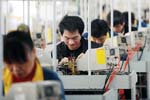Concerns grow over safety of food imports
Updated: 2012-02-01 07:25
By Zhao Shengnan (China Daily)
|
|||||||||||
"I'm not sure whether the milk powder I bought was tainted, or how to deal with the milk powder I still have," she said.
The dilemma Gao faced is one shared by the growing numbers of Chinese people opting for imported food.
Imported food soared in popularity after the 2008 melamine-tainted milk scandal in China, which resulted in the deaths of six children.
In 2010, the nation imported dairy products worth $2 billion, up 91.6 percent year-on-year.
During the first seven months of 2011, China imported food and drinks worth more than $18.27 billion, up 28 percent on the previous year, according to ChinaIRR.org.
A manager surnamed Lin at Importfood.net, a Guangdong-based online business platform for imported food, said that with improving living standards and greater expectations regarding food quality, more and more Chinese prefer imported food.
Meanwhile, foreign food companies also see a big potential market in China, he said.
"We have been invited to several food trade fairs by Italian, German and Belgian food companies."
Emerging online food traders like Lin's provide Chinese people with greater access to imported food.
Wu Qian, who works for a large food trading company in Anhui province, buys imported food from online shops such as Amazon.com (China) and the US-based drugstore.com.
"I trust the big and famous online shops which provide quality food and good customer service," she said.
Besides online retailers, many Chinese profit by buying milk powder abroad and mailing it home.
Online retailer Usashopcn.com, which sells US products, promises that all the milk powder it sells is purchased from top US online stores, but it cannot guarantee that all of them are produced in the US since many well-known brands have factories all over the world, particularly in developing countries.
"If you can prove a product you bought from our website is fake - which has yet to happen, our lawyers in the US can help you to sue for compensation," said Usashopcn.com.
However, imported food is not always safe.
In January, the General Administration of Quality Supervision, Inspection and Quarantine (AQSIQ) requested the Italian embassy in China to provide more information about Italian companies suspected of selling improperly labeled olive oil to Chinese customers, and urged Italy to improve its quality control and ensure the quality and safety of olive oil exports to China.
In December, Italian police discovered that 80 percent of bottles of Italian olive oil were adulterated with lower quality oil from other Mediterranean countries.
China imported 6,502 tons of olive oil from Italy in 2010, double the figure in 2009 and accounting for 35.7 percent of China's total olive oil imports, the Chinese Consulate-General in Milan quoted Italian media as saying.
In 2011, China's entry-exit quarantine inspection authorities uncovered 1,857 batches of substandard imported food, according to AQSIQ.
Li Yuanping, a spokesman for AQSIQ, said that imported products' failure to meet China's standards regarding microorganism and additive levels was a major problem.
These products, which included drinks, biscuits and dairy products, were either returned or destroyed by the local entry-exit quarantine inspection authorities and did not enter the Chinese market, Li said.
The food industry in developed countries has developed a mature system of technology and regulations to guarantee food safety, said Wang Shiping, a professor from the College of Food Science & Nutrition Engineering of China Agricultural University (CAU).
"However, although it cannot be ruled out that imported food quality may be affected during storage and transportation, the West, facing China's huge market, also began adulterating exported food with counterfeits," he said.
Consumers' ability to safeguard their rights when they encounter problems with imported products is not easy, said Shan Zhengguo, a lawyer from Shandong Yuanding Law Firm.
Chinese laws and regulations have not stipulated how to calculate customers' losses, so they can only turn to the consumers' association, which is a civil organization without administrative power, he said.
Besides, China's relatively mild penalties for substandard imported food may lead foreign food producers to lower their quality when entering China's lucrative market, Shan added.
"If the penalties food producers from developed countries faced in China were a tough as those in their own countries, I'm sure the quality of imported food would greatly improve, " he said.
But Wang from CAU believed that public supervision motivated by the Internet serves as an effective food quality watchdog.
"The disclosure of food safety scandals by the media will definitely affect public confidence and the producers' reputation," he said.
Wang also suggested that when people buy imported food, they should have enough information about the products, rather than make "blind purchases".
- Steelmakers registered losses in 2011
- Sany buying German firm
- Unclear 2012 for ChiNext, analysts caution
- Shanghai banks lower mortgage interest rates
- Concerns grow over safety of food imports
- Multinationals keen to recruit Chinese execs
- Ministry 'ready' to face rare earth push
- PMI rises to 50.5% in January








